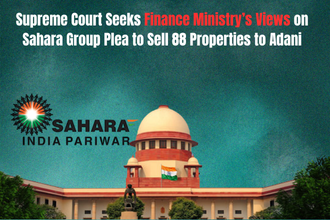Introduction
The Supreme Court of India, in a significant ruling, criticised the Punjab and Haryana High Court for adopting a “cryptic and unusual” approach while dealing with an anticipatory bail plea in a corruption case. A bench of Justice JB Pardiwala and Justice Sandeep Mehta granted anticipatory bail to the petitioner, observing that the High Court had erred in questioning the investigating agency as to why the accused had not been arrested, instead of deciding the bail application on its merits.
This judgment reiterates the settled principle that anticipatory bail pleas must be decided on merits, without unnecessary digressions or directions to the police. The ruling also highlights how the long delay in arrest—four years in this case—should have weighed in favour of granting protection from custodial arrest.
Background of the Case
The petitioner, Gursewak Singh, was facing allegations under Sections 7 and 7A of the Prevention of Corruption Act, 1988, along with Section 120B of the Indian Penal Code (IPC). The FIR was registered in 2021, alleging involvement in a bribery conspiracy.
Singh initially believed that no case was pending against him since his suspension order was revoked and he was reinstated into service on September 27, 2023. However, in 2025, he received a communication from the Deputy Commissioner directing him to appear before the Economic Offences Branch, which triggered his apprehension of arrest. Consequently, he moved the High Court seeking anticipatory bail under Section 438 CrPC.
High Court Proceedings
Instead of ruling on the plea, the Punjab and Haryana High Court passed an unusual order. It directed the Director General of Police, Punjab, to file an affidavit explaining:
- Why a chargesheet under Section 173(2) CrPC had not yet been filed.
- Why the petitioner had not been arrested in the last four years.
This order effectively shifted the focus from bail adjudication to a fact-finding inquiry against the police, without addressing the core issue of whether the petitioner was entitled to anticipatory bail. Dissatisfied, the petitioner approached the Supreme Court through a Special Leave Petition (SLP).
Supreme Court’s Observations
The Supreme Court strongly disapproved of the manner in which the High Court handled the case. Key observations included:
- On judicial approach:
“Either the High Court should have allowed the application granting anticipatory bail or should have declined it on its own merits. We do not approve the manner in which the High Court has dealt with the plea of anticipatory bail.” - On the question of non-arrest:
The Court noted that asking the investigating agency why the accused was not arrested for four years was unwarranted. In fact, the non-arrest for such a long duration was itself a good ground for granting anticipatory bail. - On co-accused parity:
The Court also pointed out that a co-accused, who was alleged to have actually accepted the bribe, had already been granted anticipatory bail. This strengthened the petitioner’s claim to similar relief. - On delay in seeking bail:
The Court asked why anticipatory bail was sought in 2025 for an FIR registered in 2021. The petitioner explained that he was under the impression no active case was pending against him until he was summoned in 2025. The Court accepted this explanation.
Final Decision
After considering the facts and circumstances, the Supreme Court:
- Granted anticipatory bail to the petitioner.
- Directed that if arrested, he shall be released on bail subject to conditions imposed by the Investigating Officer.
- Clarified that the High Court should not have diverted from the merits of the case by questioning the police.
By deciding the matter finally, instead of remanding it back to the High Court, the Supreme Court avoided further delay and ensured justice to the petitioner.
Legal Significance of the Judgment
This ruling is significant for several reasons:
1. Reaffirmation of Judicial Duty
The Supreme Court reminded the High Courts that anticipatory bail matters must be adjudicated strictly on legal principles and merits, not by issuing collateral directions to the police.
2. Protection Against Arbitrary Arrest
The Court underscored that prolonged non-arrest indicates lack of necessity for custodial interrogation and should weigh heavily in favour of granting anticipatory bail.
3. Principle of Parity
When co-accused similarly situated have already been granted bail, denying the same relief to another accused amounts to discrimination.
4. Clarity in Bail Jurisprudence
The ruling provides guidance on how Section 438 CrPC must be interpreted—emphasising discretion, balance of liberty with investigation needs, and avoidance of mechanical or cryptic orders.
Impact on Future Cases
The Supreme Court’s decision will likely influence how High Courts handle anticipatory bail applications in corruption cases and other serious offences. The key takeaways are:
- High Courts cannot bypass merits by shifting responsibility to the police.
- Delay in arrest strengthens the presumption against custodial detention.
- Judicial orders must be reasoned, not “cryptic” or template-based.
- Liberty of individuals must be given due consideration, especially when the accused has cooperated with the investigation.
Conclusion
The judgment in Gursewak Singh v. State of Punjab serves as a reminder that anticipatory bail is a safeguard against arbitrary arrest and harassment. By criticising the Punjab and Haryana High Court’s approach, the Supreme Court reaffirmed that courts must discharge their judicial responsibility with clarity, reasoning, and fairness.
In corruption-related offences, while ensuring that investigation is not hampered, the courts must also ensure that the fundamental right to personal liberty under Article 21 of the Constitution is not compromised by procedural lapses or unnecessary delays.
This decision not only benefits the petitioner but also strengthens the jurisprudence on anticipatory bail, ensuring that judicial discretion is exercised in a principled and consistent manner.
Also Read
Allahabad High Court Rejects Plea Against Jolly LLB 3: Nothing Objectionable in Trailers or Songs


